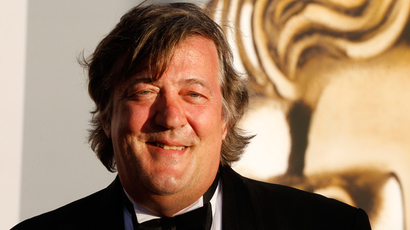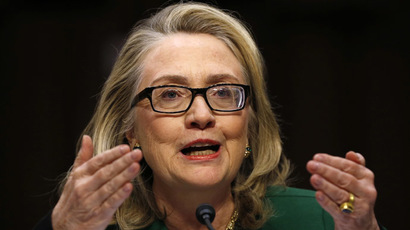'Outrageous!' Moscow hits back at Prince Charles over Putin-Hitler comparison
Moscow has demanded an official explanation from the UK over reported comments in which Prince Charles, heir to the British throne, compared Vladimir Putin’s actions in Ukraine to those of Adolf Hitler in the run up to World War II.
“If such comments were genuinely made, they do not reflect
well on the future King of England. We are not concerned, we are
outraged,” said Russian Foreign Ministry spokesman Aleksandr
Lukashevich.
“As one of the members of the UK’s Labour Party said, royals
should be seen and not heard,” continued the Russian
official, who said that any response will depend on the
explanation offered by the British side.
The Russian ambassador in London met with Foreign Office
representatives on Thursday afternoon, but the British side
refused to comment on what it termed a "private conversation".
The royal’s remarks, allegedly made to a 78-year-old Canadian
during an official visit to the country, surfaced earlier this
week.
When Marienne Ferguson described escaping Gdansk in Poland 1939
ahead of the invasion by Nazi Germany, the prince reportedly said
“And now Putin is doing just about the same as Hitler,”
referring to the recent incorporation of formerly Ukrainian
Crimea into Russia.

Ferguson, who revealed the conversation to the Daily Mail, said the remarks appeared “heartfelt and honest.”
The Royal Family’s press office did not deny the content of the chat, but insisted that “the Prince of Wales would not seek to make a public political statement during a private conversation."
The comments provoked a mixed response from the UK’s political class.
"If Prince Charles wants to make controversial statements on national or international issues he should abdicate and stand for election. In a constitutional monarchy, policy and diplomacy should be conducted by parliament and government. Monarchy should be seen and not heard," said a tweet from Mike Gapes, a senior Labour MP and former chairman of the Foreign Affairs Select Committee, the UK parliament’s international policy body.
But his party leader, Ed Miliband, said that the King-in-waiting “has got a point about President Putin’s actions and he is absolutely entitled to say that there are real concerns about that.”
Just as the Foreign Office, Prime Minister David Cameron said it was not his business to comment on private conversations, but stated that “everyone’s entitled to their private opinions.”

Liberal Democrat Deputy Prime Minister Nick Clegg was also
sanguine.
"I have never been of this view that if you are a member of
the royal family somehow you have to enter into some Trappist vow
of silence," he told the BBC.
An influential political voice from outside of parliament came
from Nigel Farage, the leader of UKIP, who previously described
Putin as the politician whose savvy he most admires.
“I think there’s a difference [between Putin and Hitler] and the
difference, I think, is that right from the very start Hitler was
expansionist and we haven’t seen much evidence of that until now
from Putin.
"And arguably what’s happened in the Ukraine is because he’s been
poked with a stick by the rest of the world.
"All I want to say is this: I think the EU pursuing an
expansionist foreign policy and saying to the Ukraine, ‘We want
you to join our political union, oh, and why not join NATO too?’
That’s not exactly helped things in the region."
While Prince Charles’ comments are controversial in view of
sensitivity to political meddling from unelected Royals, and his
previous array of outspoken views on issues as wide-ranging as
global warming and UK’s education system, this is not the first
time this comparison has been made by a senior figure.
Back in March, the frontrunner for the next US Democratic
presidential nomination Hillary Clinton made a similar comment,
saying that Putin’s international stance “sounds familiar,
it’s what Hitler did back in the ’30s.”














